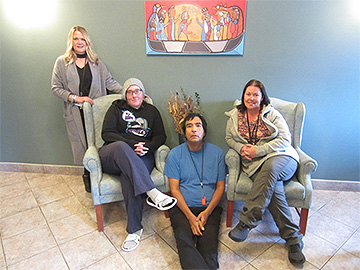News
Finding Home, Hope and Health

Clinical Supervisor Colleen Veneruzzo (left)
and RPN Suzy Hill (right) with The Lodge
residents Crystal and Curtis.
Date: 2019-12-17
The Lodge on Dawson offers much-needed transitional housing
“I’ve always lived where there’s drugs and violence,” says Crystal. “Here, the staff care about us. They’ve all got big hearts. They’re the dream team.” Crystal is one of the residents at the newly opened Lodge on Dawson, which provides transitional housing for people living with addiction and mental health challenges and dealing with chronic homelessness. If you’re living with mental health and addictions and you don’t have a home or support network, bouncing between the emergency room, shelters, withdrawal management, and perhaps even jail can become a devastating spiral that’s hard to escape. “It can be very challenging to try and find stable housing or navigate systems in the city in order to start recovery and make good health connections,” says Colleen Veneruzzo, a Registered Nurse with St. Joseph’s Care Group, and the Clinical Supervisor at The Lodge. “That’s the whole purpose of The Lodge: stabilization and transitional housing with the hope people can get on their journey into recovery and their own housing.”
A joint venture between St. Joseph’s Care Group, the District of Thunder Bay Social Services Administration Board, St. Joseph’s Foundation of Thunder Bay, Dilico Anishinabek Family Care, and Alpha Court, The Lodge was funded in part by the Ontario Ministry of Municipal Affairs and Housing to address Thunder Bay’s housing gap - there are more than 1,000 people in the city on the wait list for housing, and shelters are beyond capacity. The Lodge is a former inn located on Dawson Road, and has 30 beds that support all gender identities. There are two people in each simply furnished room with an attached bathroom. There are also two accessible rooms. The Lodge’s clinical team includes registered nurses, registered practical nurses, community support assistants, leisure life skills instructors, a social worker, and physicians as part of an outpatient clinic. People are usually referred by community workers who are placing housing as the priority, and each potential resident must go through an assessment and eligibility screening to ensure The Lodge will be the right fit for them and their needs. They can stay for up to 364 days if required, but the goal is to help people transition to more independent housing sooner.
“A typical day includes medication management, assisting clients with their activities of daily living, establishing routines, prompting life skills like doing laundry and room cleaning, and encouraging healthy coping skills. But it's the stuff that happens in between the formal schedule that’s not typical: sitting down and having a conversation, playing a game of cards - connecting with people and letting them be reminded of their importance”, says Suzy Hill, a RPN at The Lodge. “We also help support them to see their family doctor if they have one, book appointments and communicate with them around medical needs or concerns. We can watch for any signs or symptoms of health problems and be highly responsive should the need arise.”
In one main hallway, a big whiteboard lists the chores that each resident is responsible for, like snow shovelling or mopping, in addition to cleaning their own rooms. On another wall, a bulletin board is lined with notices about community events, like Narcotics Anonymous and Alcoholics Anonymous meetings, a local rock painting group, public pool swim times and other ideas for residents to keep building on their plans to fill their life with healthier leisure options. The Lodge is on a section of wooded land, so there’s already a fire pit for cozy campfires where residents can connect over a cup of hot chocolate and laughter, and future plans include walking trails and other outdoor activities designed to help residents connect with the calmness of nature. Community partners, such as Dilico, Thunder Bay Literacy, and the Ontario Native Women’s Association, offer many skill building groups such as literacy, cultural teachings, recreational therapy and cooking groups.
“It’s true concurrent care,” notes Darcy McWhirter, Manager of Crisis and Outreach Programs with St. Joseph’s Care Group. “It’s not only addictions care, it’s not only mental health care and it’s not only housing. I think that’s what sets The Lodge on Dawson apart. We help to identify goals in all areas, recognizing that needs change rapidly and the system is often not equipped to respond effectively to such rapid change.” For Crystal, The Lodge was transformative. “I’ve been struggling with a lot of bad stuff throughout my life. I came to Thunder Bay to get clean, I didn’t have anywhere to live, so I moved to the shelter for six months after completing treatment and I really started going downhill. If it wasn’t for this place I would probably be all sketched out in an alley.” When she heard about The Lodge opening, she immediately asked to be considered so she could continue to have supports in her sobriety. “I also like that they teach us about mental illness - it’s not just, ‘here’s what you have,’ they help you learn about it and how to deal with it.” Veneruzzo says she’s observed a notable difference in Crystal. “Crystal is very particular about certain routines and if someone is disrespecting that, it’s very upsetting to her. Before, she would become highly disregulated in her emotions, but since she’s been here her ability to regulate has been greatly improved via her learning skills. She can take a step back, calm down, and then try a bit of conflict resolution.”
Today, Crystal dreams of completing school and working with struggling teens or in a place like The Lodge. “They make me feel like I have a second chance at life again.”
